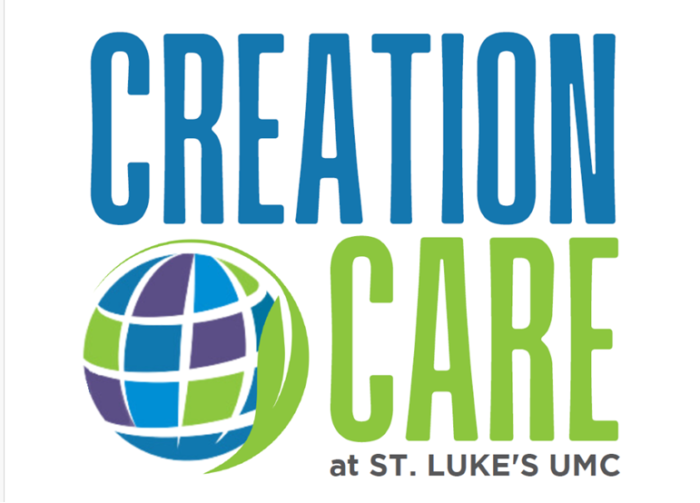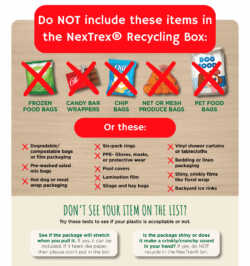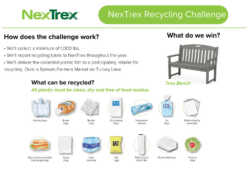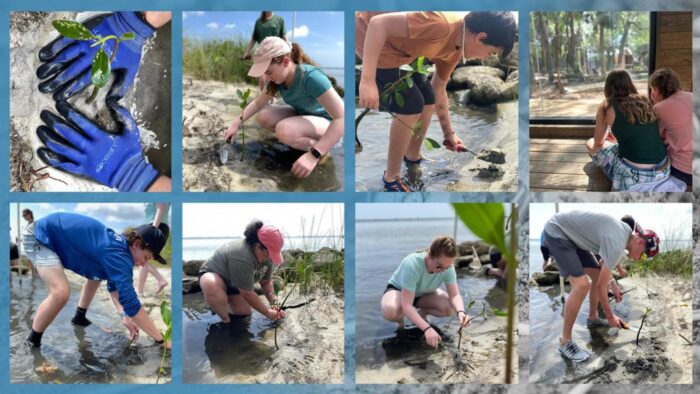As St. Lukers, we believe that a relationship with God’s creation, and a ministry of caring for and healing the earth, is integral to being a Christian. Our natural world is to be valued and conserved because God has called humanity to be its caretakers (Genesis 1:26-31). In our 24 & More Vision, we voted to prioritize addressing the climate crisis and are making strides toward a “greener,” more environmentally conscious St. Luke’s community.
Bags to Benches NexTrex Recycling Challenge
Bags to Benches! NexTrex Recycling Challenge
St. Luke’s is excited to participate in the NexTrex Recycling Challenge this year, a nationwide initiative that encourages churches, schools, and organizations to collect plastic film waste that is difficult to recycle through curbside programs. By collecting items like grocery bags, bread bags, and plastic mailers, we can help divert waste from landfills. Our goal is to collect 1,000 pounds of plastic over the next year! Once we collect and submit 1,000 lbs of plastic, NexTrex will give us a bench made out of recycled plastic for us to put on our campus!
What can you recycle?
We are collecting clean and dry plastic film, such as:
- Grocery bags
- Bread bags
- Case overwrap (like from paper towels, toilet paper, or bottled water)
- Dry cleaning bags
- Plastic shipping envelopes
- Cereal box liners
- Bubble wrap and air pillows
- Ice bags
- Produce bags
Please bring your items to the designated white NexTrex recycling bins, located next to the trash and recycling bins at both worship venues, starting Sunday, January 5th. We will continue collecting plastic throughout the year till December 31st, 2025.
Why It Matters
At St. Luke’s, we are committed to caring for God’s creation and protecting the environment. By participating in the NexTrex Recycling Challenge, we are taking an important step in reducing waste, conserving resources, and being good stewards of the Earth. Together, we can make a difference by keeping plastic out of landfills and helping to create sustainable products!
How to Participate
It’s easy to get involved! Simply drop off your clean and dry plastic film at the designated white bins. Only plastics that are clean and free from food residue can be recycled, so be sure to check the list of acceptable items above. Share the challenge with friends and family and encourage them to join us!
Plastic Reduction Tips
In addition to recycling, consider ways to reduce your plastic use in daily life. Bring reusable bags when you shop, choose products with minimal packaging, and opt for reusable containers whenever possible. Small changes can have a big impact!
4 Creation Care Activities and Ideas for Earth Day and Every Day!
4 Creation Care Activities and Ideas!
Celebrate Earth Day every day by appreciating and respecting the natural world. Here are some ideas to inspire you this year.
- Reduce Single-Use Plastic Consumption
Did you know? Unfortunately, less than 30% of all single-use plastic bottles sold in the U.S. actually end up getting recycled.
One of the simplest ways to make a difference is to swap your plastic bottle for a reusable one. Staying hydrated is especially important when out in the Florida heat. But staying healthy doesn’t have to come at an environmental cost. Creating just one single-liter plastic water bottle requires at least 6 liters of water to produce. By using a reusable water bottle, not only will you help conserve water, but you will also help limit the number of plastic bottles that flood landfills and waterways.
Already have a reusable water bottle and ready for the next step? Here are some other Zero Waste swaps to consider switching to. 17 Zero Waste Swaps to Start Your Zero Waste Lifestyle
2. Try Composting
Did you know? ⅓ of all food produced each year is wasted (approx. 1.3 billion tons) and when organic material, like food, breaks down in a landfill, it creates methane, a greenhouse gas over 20 times more potent than carbon dioxide.
Consider composting leftover organic materials from your meals. Composting is nature’s way of recycling. It is one of the most powerful actions we can take to reduce our trash, address climate change, and build healthy soil. Organic materials like fruit/veggie scraps or coffee grounds can be composted and used as fertilizer for plants and gardens. This helps keep food waste out of landfills, where it would produce methane during decomposition. By turning our food scraps and yard trim into compost, we transform our waste streams into a beneficial, value-added soil amendment and use it to protect the environment and create resilient communities.
3. “Green” Your Style
Did you know? The volume of clothing Americans throw away each year has doubled in the last 20 years from 7 million to 14 million tons. Sadly, the fashion industry is the second largest global polluter after the oil industry.
Participate in clothing swaps, buy second-hand, and shop at thrift stores. When you’re ready to get rid of clothes, try to sell them at a resale store, swap them at a clothing swap, or donate them to local thrift stores or homeless shelters. This is the best way to be sure none of your clothes end up in a landfill. The Blessed Treasure’s shop is a great place to donate your gently used items!
4. Eat Plant-Based Foods
Did you know? going vegan for two-thirds of meals could cut food-related carbon emissions by 60%.
Opting for a plant-based diet can curtail emissions by lessening the energy needed to produce food and by minimizing the release of methane and nitrous oxide from livestock farming that contribute to greenhouse gases in the atmosphere. According to World in Data, almost half of the habitable land is used for agriculture. Moreover, three-quarters of this is used for livestock, meat, and dairy. Yet, these three items only provide 18% of calories and 37% of protein globally.
Industrial agriculture accounts for around 85% of global deforestation. While this can mostly be attributed to meat production (particularly beef), large-scale soy and palm oil plantations follow closely behind as causes of deforestation.
But before you shun the tofu, let’s take a closer look: meat producers clear vast swaths of forest to graze their livestock, and around 80% of all soybeans grown go directly to feed cattle, poultry, and pigs.
The shift towards a plant-based diet can be straightforward and achievable!
You can start by incorporating more vegetarian dishes into your meal plans.
- This can be a gradual process. Slowly replace meat with vegetarian alternatives such as beans, lentils, tofu, seitan, or tempeh.
- If you are up for a challenge, you can also explore vegan recipes. Once you are comfortable cooking vegetarian meals, moving on to vegan recipes will be effortless.
The food you purchase can also reduce your environmental impact.
- Shopping for groceries and focusing on locally sourced and organic products can have manifold benefits. This not only supports local farmers but also reduces your carbon footprint.
- Opting for seasonal produce is another area to consider. Seasonal fruits and vegetables are usually fresher and packed with more vitamins and minerals.
- By comparison, imported produce grown year-round in greenhouses is more energy intensive.
Lastly, do not overlook portion sizes when transitioning to a plant-based diet. Consuming smaller portions can reduce waste and prevent leftover food from rotting in the fridge after every meal.
What is Creation Care?
Creation Care!
A relationship with God’s creation and a ministry of caring for and healing the earth is integral to being a United Methodist.
We believe that all of creation is God’s and that we are responsible for how we use and abuse it. Our natural world is to be valued and conserved because God has called humanity to be its caretakers (Genesis 1:26-31). Explore the ways we, as United Methodists, care for and love all of creation and are committed to keeping our planet green, clean, and sustainable for all.
To Restore Hope for our neighbors experiencing hunger, homelessness, and poverty, we have to actively be involved in Creation Care. In the words of EPA Administrator Michael S. Regan, “The impacts of climate change that we are feeling today, from extreme heat to flooding to severe storms, are expected to get worse, and people least able to prepare and cope are disproportionately exposed.” The most severe harms from climate change fall unfairly upon underserved communities that are least able to prepare for and recover from impacts like heat waves, poor air quality, and flooding. The climate crisis exacerbates issues like the refugee crisis, hunger, disease, poverty, biodiversity loss, deforestation, air pollution, and scarcity of resources.
Our responsibility to repair the damage we’ve done is biblical. As bearers of God’s image, all people have the responsibility of caring for God’s creation. The Book of Discipline calls United Methodists to be caretakers of God’s Creation: (¶ 160 Preamble) All creation is the Lord’s, and we are responsible for the ways in which we use and abuse it. Water, air, soil, minerals, energy resources, plants, animal life, and space are to be valued and conserved because they are God’s creations and not solely because they are useful to human beings.
Join the Creation Care Green Team!
Join the Green Team!
Join the movement to save the Earth! The Creation Care Green Team is a diverse group of St. Lukers aspiring to care for God’s Creation. This team organizes and participates in Creation Care events like Tree planting, Beach cleanups, and Shoreline restorations as well as supports St. Luke’s green initiatives like the Grow It Forward Microfarm, the UWIF Rummage Sale, and going Solar. This is an intersectional ministry! Opportunities to serve in this ministry are vast and there is truly something for everyone. The team needs researchers, event coordinators, volunteers, and advocates. All are welcome and encouraged to join this team and to care for God’s Creation!
Contact Saniye Kazan at skazan@st.lukes.org if you are interested in joining a team of Creation Care activists who work on making our community more sustainable and earth-friendly.
Can I Recycle This?
What’s your Carbon Footprint?
Want to see how big your Carbon Footprint is?
Calculate your Ecological Carbon Footprint here:
2023 Creation Care Youth Summer Mission Experience!
St. Luke’s Middle School Youth Making Waves!
Did you know that Florida ranks 10th for the nation’s most rampant illegal water pollution incidents? St. Luke’s Middle School Youth Made Waves on their Creation Care Advocacy Mission Experience this summer! Visit the link below to read more and learn how you can help our friends over and Under the Sea!
Contact Saniye Kazan at skazan@st.lukes.org if you are interested in joining a team of Creation Care activists who will work on making our community more sustainable and earth-friendly.





